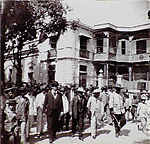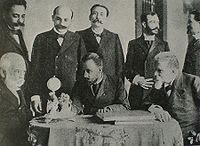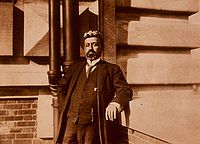- Cipriano Castro
-
Cipriano Castro 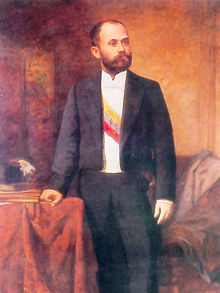
37th President of Venezuela In office
20 October 1899 – 19 December 1908Preceded by Ignacio Andrade Succeeded by Juan Vicente Gómez Personal details Born 12 October 1858
Capacho, Táchira, VenezuelaDied 4 December 1924 (aged 66)
San Juan, Puerto RicoSpouse(s) Zoila Rosa Martínez Religion Roman Catholic Signature 
José Cipriano Castro Ruiz (1858–1924) was a high ranking member of the Venezuelan military, politician and the President of Venezuela from 1899 to 1908. He was the first man from the Andes to rule the country, and was the first of five military strongmen from the Andean state of Táchira to rule the country over the next 46 years.
Contents
Early life
Cipriano Castro was the son of José Carmen Castro and Pelagia Ruiz. He was born on 12 October 1858 in Capacho, Táchira. Castro's father was a mid-level farmer and he received the an education typical of the tachirense middle-class. His family had significant mercantile and family relations with Colombia, in particlular with Cúcuta and Puerto Santander. After studying in his native town and the city of San Cristóbal, he continued his studies at a seminary school in Pamplona, Colombia (1872–1873). He left those studies to return to San Cristóbal, where he began work as employee of a company called Van Dissel, Thies and Ci'a. He also worked as a cowboy in the Andean region.
Military experience and introduction to politics
In 1876 Castro opposed the candidacy of general Francisco Alvarado for the presidency of the Táchira state. In 1878 he was working as the manager of the newspaper El Álbum when he participated along with a group of independence advocates in the seizure of San Cristóbal when they refused submit to the authority of the new president of the state.
In 1884, he got into a disagreement with a parish priest, Juan Ramón Cárdenas in Capacho, which led to his imprisonment in San Cristóbal. After six months, he escaped and took refuge in Cúcuta, where he ran an inn.[1]. There he met his future wife, Rosa Zoila Martinez, who would become known as Doña Zoila. In June 1886, he returned to the Táchira as a soldier, accompanying generals Segundo Prato, Macabeo Maldonado and Carlos Rangel Garbiras to again raise the flag of autonomy, much to the dismay of the governor of the Táchira region, General Espíritu Santo Morales. Castro defeated government forces in Capacho Viejo and in Rubio. Promoted to general, himself, Castro began to stand out in the internal politics of Táchira state. It was during the burial of a fellow fighter, Evaristo Jaimes, who had been killed in the earlier fighting that Castro met Juan Vicente Gómez, his future companion in his rise to power. He entered politics and became the governor of his province of Táchira but was exiled to Colombia when the government in Caracas was overthrown in 1892. Castro lived in Colombia for seven years, amassing a fortune in illegal cattle trading and recruiting a private army.
Presidency
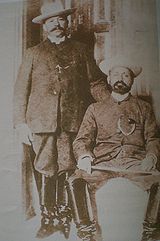 Juan Vicente Gómez and Cipriano Castro
Juan Vicente Gómez and Cipriano Castro
Amassing considerable support from disaffected Venezuelans, Castro's once personal army developed into a strong national army, and he used it to march on Caracas in October 1899 in an event called the Revolución Liberal Restauradora, and seize power, installing himself as the supreme military commander.
Once in charge, Castro inaugurated a period of plunder and political disorder having assumed the vacant presidency, after modifying the constitution (1904). He remained president for the period 1904-1911, designating Juan Vicente Gomez his "compadre" as vice-president.
Castro's rule was marked by frequent rebellions, the murder or exile of his opponents, his own extravagant living, and trouble with other nations. Castro was characterized as "a crazy brute" by United States secretary of state Elihu Root and as "probably the worst of Venezuela's many dictators" by historian Edwin Lieuwen. His nine years of despotic and dissolute rule are best known for having provoked numerous foreign interventions, including blockades and bombardments by British, German, and Italian naval units seeking to enforce the claims of their citizens against Castro's government.
Venezuela Crisis of 1902-1903
Main article: Venezuela Crisis of 1902–1903 Caricature of Cipriano Castro, by W.A. Rogers, published in the New York Herald, January, 1903
Caricature of Cipriano Castro, by W.A. Rogers, published in the New York Herald, January, 1903
The Venezuela Crisis of 1902–1903 saw a naval blockade of several months imposed against Venezuela by Britain, Germany and Italy over Castro's refusal to pay foreign debts and damages suffered by European citizens in a recent Venezuelan civil war. Castro assumed that the United States' Monroe Doctrine would see the US prevent European military intervention, but at the time the US saw the Doctrine as concerning European seizure of territory, rather than intervention per se. With prior promises that no such seizure would occur, the US allowed the action to go ahead without objection. The blockade saw Venezuela's small navy quickly disabled, but Castro refused to give in, and instead agreed in principle to submit some of the claims to international arbitration, which he had previously rejected. Germany initially objected to this, particularly as it felt some claims should be accepted by Venezuela without arbitration.
When the US press reacted negatively to incidents including the sinking of two Venezuelan ships and the bombardment of the coast, the US pressured the parties to settle, and drew attention to its nearby naval fleet. With Castro failing to back down, US pressure and increasingly negative British and American press reaction to the affair, the blockading nations agreed to a compromise, but maintained the blockade during negotiations over the details. This led to the signing of an agreement on 13 February 1903 which saw the blockade lifted, and Venezuela commit 30% of its customs duties to settling claims. When an arbitral tribunal subsequently awarded preferential treatment to the blockading powers against the claims of other nations, the US feared this would encourage future European intervention. The episode contributed to the development of the Roosevelt Corollary to the United States' Monroe Doctrine, asserting a right of the United States to intervene to "stabilize" the economic affairs of small states in the Caribbean and Central America if they were unable to pay their international debts, in order to preclude European intervention to do so.
Dutch-Venezuela War
Five years later, however, Castro again incited foreign naval intervention, this time by the Dutch, who seized a port and destroyed part of Venezuela's tiny navy.
Castro's overthrow in 1908, exile and death in 1924
In 1908 Castro had been seriously ill for four years due to a kidney problem.[2] Castro left for Paris in late 1908 to seek medical treatment for Syphilis, leaving the government in the hands of his lieutenant Gómez, the man who was instrumental in his victory of 1899. However, Gómez seized power himself. Castro spent the rest of his life in exile, mostly in Puerto Rico, making several plots to return to power — none of which were successful. Castro died 4 December 1924, in San Juan, Puerto Rico.
Cipriano Castro cabinet (1899-1908)
Ministries [3] OFFICE NAME TERM President Cipriano Castro 1899–1908 Home Affairs Juan Francisco Castillo 1899–1900 Rafael Cabrera Malo 1900–1901 José Antonio Velutini 1901–1902 Rafael López Baralt 1902–1903 Leopoldo Baptista 1903–1907 Julio Torres Cárdenas 1907 Rafael López Baralt 1907–1908 Outer Relations Raimundo Andueza Palacio 1899–1900 Eduardo Blanco 1900–1901 Jacinto Regino Pachano 1901–1902 Diego Bautista Ferrer 1902–1903 Alejandro Urbaneja 1903 Gustavo Sanabria 1903–1905 Alejandro Ibarra 1905–1906 José de Jesús Paúl 1906–1908 Finance Ramón Tello Mendoza 1899–1903 José Cecilio De Castro 1903–1906 Francisco de Sales Pérez 1906 Gustavo Sanabria 1906 Eduardo Celis 1906–1907 Arnaldo Morales 1906–1907 War and Navy José Ignacio Pulido 1899–1902 Ramón Guerra 1902–1903 José María García Gómez 1903 Manuel Salvador Araujo 1903–1904 Joaquín Garrido 1904–1905 José María García Gómez 1905–1906 Diego Bautista Ferrer 1906 Manuel Salvador Araujo 1906–1907 Diego Bautista Ferrer 1907–1908 Development José Manuel Hernández 1899 Celestino Peraza 1899 Guillermo Tell Villegas Pulido 1899–1900 Ramón Ayala 1900–1901 Felipe Arocha Gallegos 1901–1902 Arnaldo Morales 1902–1903 José T. Arria 1903 Rafael Garbiras Guzmán 1903–1904 Arnaldo Morales 1904–1905 Diego Bautista Ferrer 1905–1906 Arístides Tellería 1906 Arnaldo Morales 1906 Jesús María Herrera Irigoyen 1906–1908 Public Works Victor Rodríguez 1899 Juan Otáñez Maucó 1899–1902 Rafael María Carabaño 1902–1903 Ricardo Castillo Chapellín 1903 Alejandro Rivas Vásquez 1903–1904 Ricardo Castillo Chapellín 1904–1906 Luis Mata Illas 1906 Juan Casanova 1906–1908 Public Instruction Manuel Clemente Urbaneja 1899–1900 Félix Quintero 1900–1901 Tomás Garbiras 1901–1902 Rafael Monserrate 1902–1903 Eduardo Blanco 1903–1905 Arnaldo Morales 1905–1906 Enrique Siso 1906 Carlos León 1906 Eduardo Blanco 1906 Laureano Villanueva 1906–1907 José Antonio Baldó 1907–1908 Secretary of Presidency Celestino Peraza 1899 Julio Torres Cárdenas 1899–1906 Lucio Baldó 1906 José Rafael Revenga 1906–1907 Rafael Gárbiras Guzmán 1907–1908 Leopoldo Baptista 1908 References
- ^ Unsigned (28 August 1901) "Man of Mark: Is President Castro Whose Life of War, Adventure and Romance Would Keep a Dozen Novelists Busy" Moberly Evening Democrat (vol. 31) (Moberly Missouri) p.1, col. 3
- ^ William M. Sullivan, "The Harassed Exile: General Cipriano Castro, 1908-1924", The Americas Vol. 33, No. 2 (Oct., 1976), pp. 282-297
- ^ “Gaceta Oficial de Venezuela” Period 1899-1908
External links
Presidents of Venezuela Mendoza · Bolívar · Páez · Vargas · Carreño · Narvarte · Carreño · Soublette · Páez · Soublette · J.T. Monagas · J.G. Monagas · J.T. Monagas · Gual · J. Castro · Gual · Tovar · Gual · Páez · Falcón · Bruzual · Villegas · J.R. Monagas · Villegas · Guzmán · Linares · Valera · Guzmán · Crespo · Guzmán · H. López · Rojas · Andueza · Villegas · Villegas Pulido · Crespo · Andrade · C. Castro · Gómez · Gil Fortoul · Márquez · Gómez · J. Pérez · Gómez · López Contreras · Medina · Betancourt · Gallegos · Delgado Chalbaud · Suárez Flamerich · Pérez Jiménez · Larrazábal · Sanabria · Betancourt · Leoni · Caldera · C. Pérez · Herrera · Lusinchi · C. Pérez · Lepage · Velásquez · Caldera · Chávez
Categories:- Presidents of Venezuela
- Venezuelan soldiers
- 1858 births
- 1924 deaths
- People from Táchira (state)
Wikimedia Foundation. 2010.


